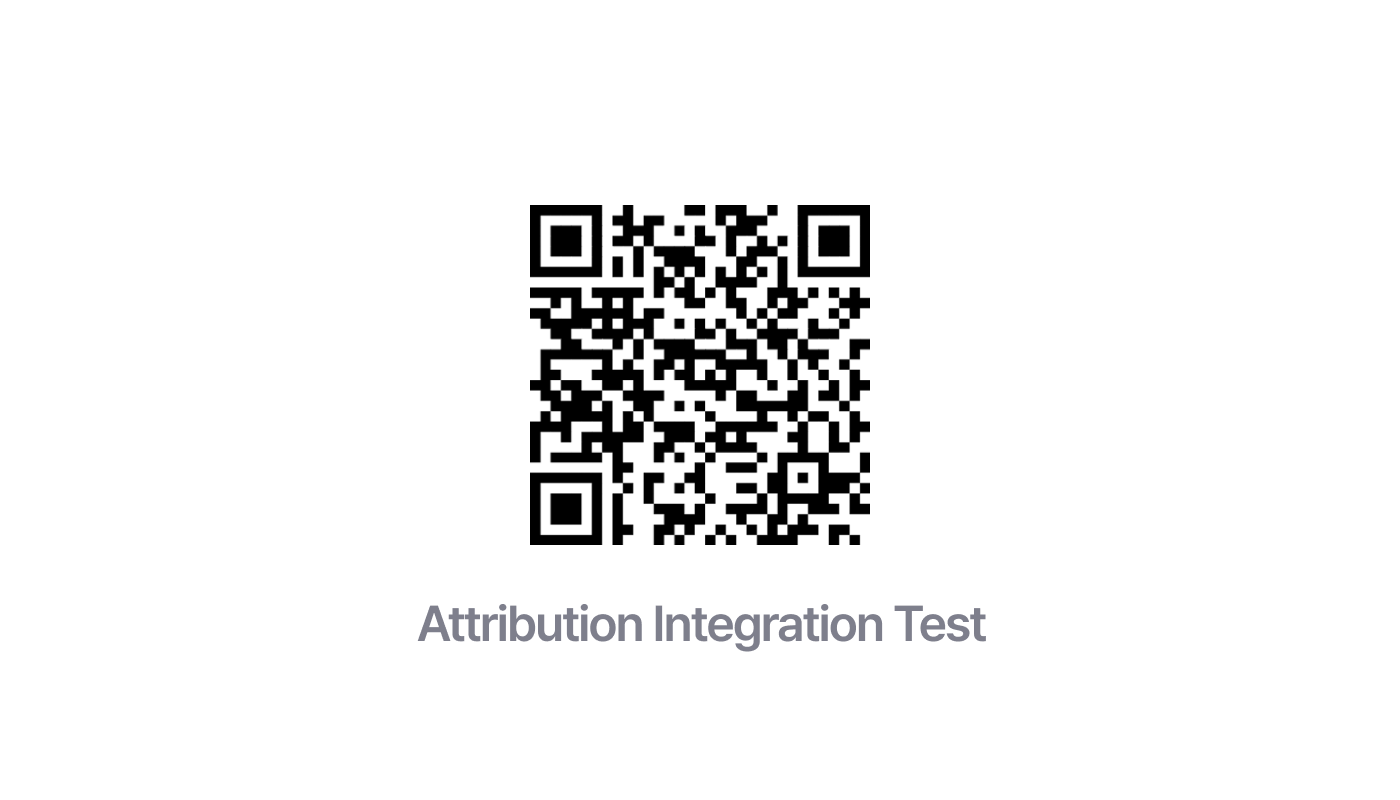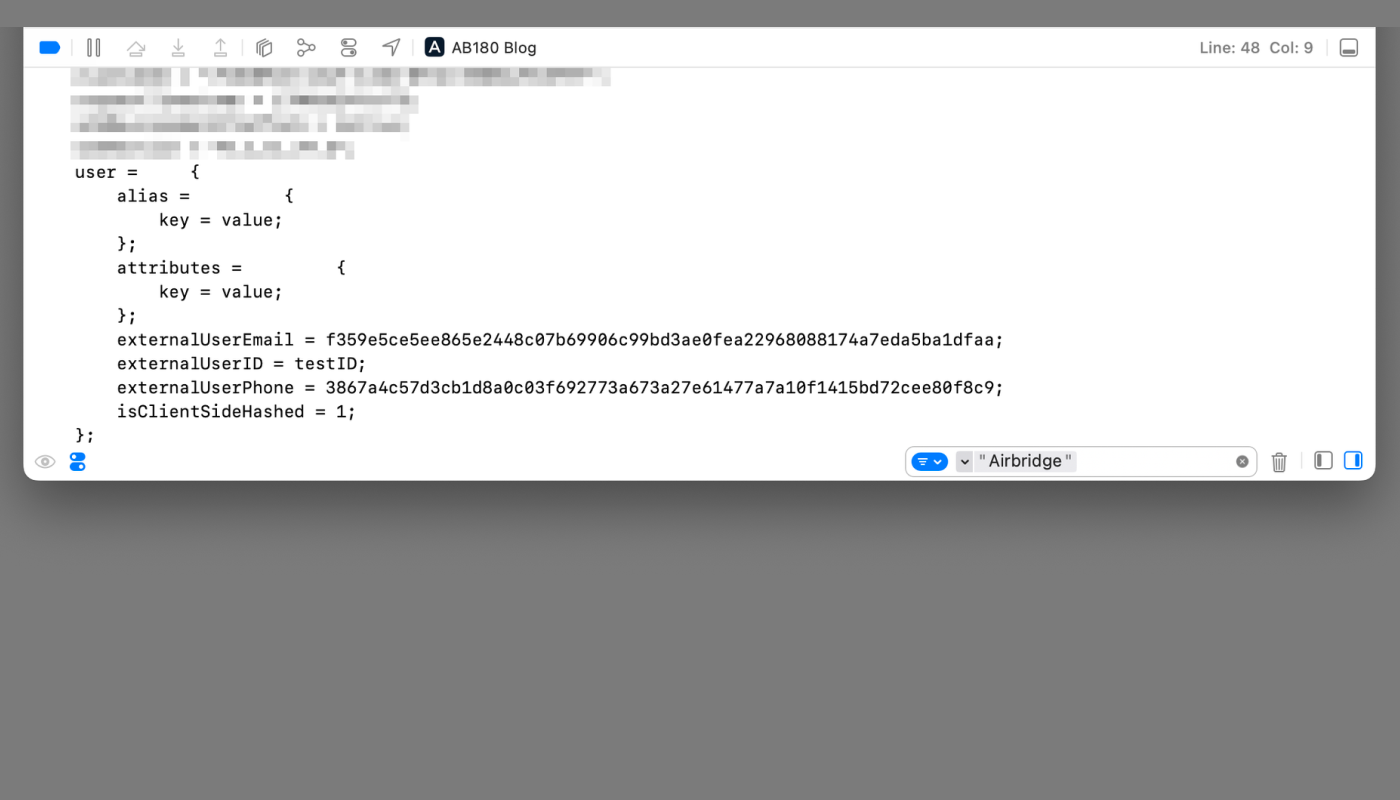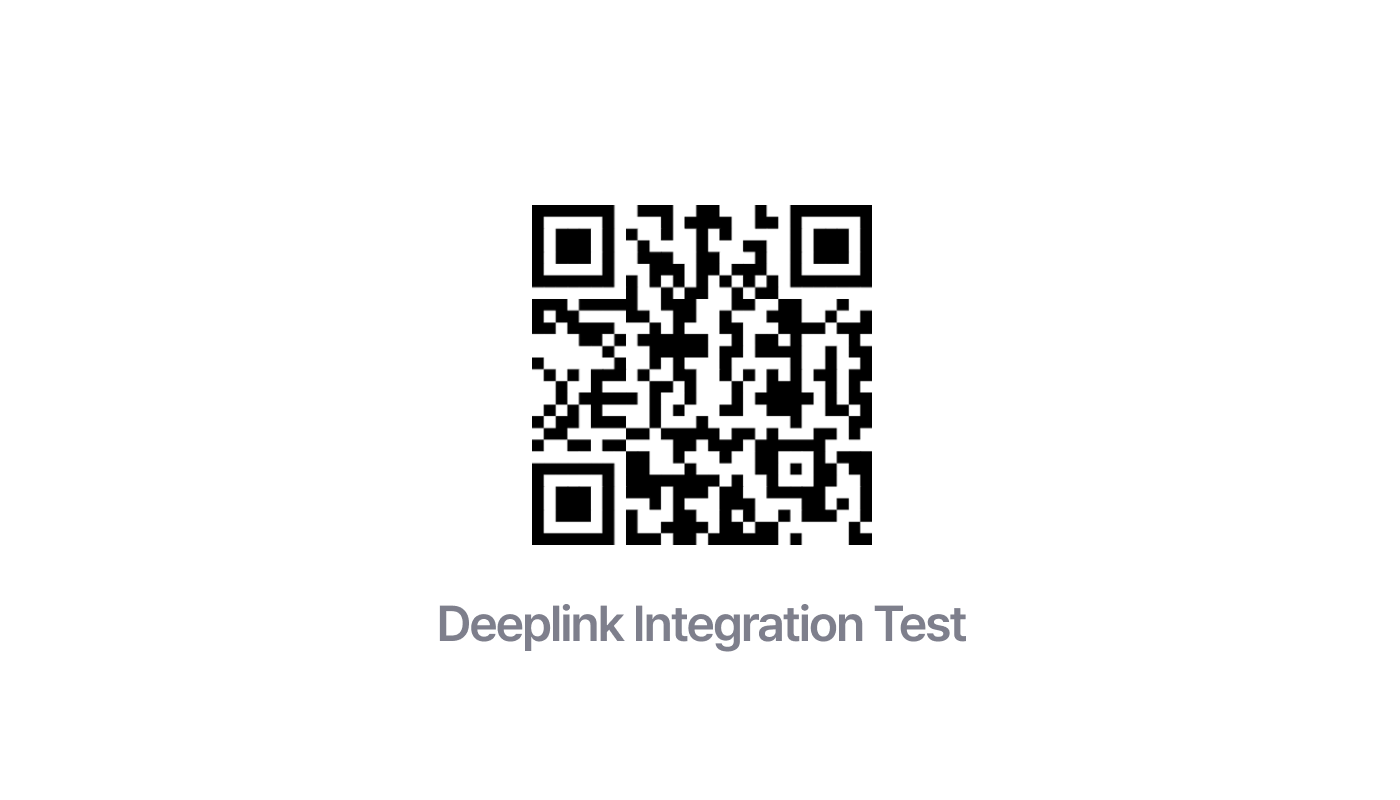Testing - iOS SDK (Previous)
SDK testing on the Airbridge dashboard
The Airbridge dashboard offers a testing console to test whether the Airbridge SDK is working properly. Install the Airbridge SDK first before proceeding with the test. For detailed instructions on how to run the SDK tests, refer to the user guide below.
After completing the Airbridge iOS SDK setup, you can test whether it works properly using real-time logs and test sites. Prepare the following information before testing the Android SDK.
Airbridge uses IDFA (Identifier for Advertisers) provided by Apple as an identifier for attribution.
Airbridge offers the "My Device ID by Airbridge" app, which quickly finds a device's IDFA. Scan the QR code below with the test device and download the app.

Check whether the Airbridge iOS SDK is operating properly. The Install event collection is performed by the iOS SDK by default and does not require additional setup.
Follow the steps below to check whether the Install events are being collected by the iOS SDK.
1. Prepare a test device where the app is not installed, or if the app is already installed, delete it before testing.
2. Set the SDK log level to LOG_ALL.
AirBridge.setLogLevel(.LOG_ALL)
AirBridge.getInstance("YOUR_APP_SDK_TOKEN", appName:"YOUR_APP_NAME", withLaunchOptions:launchOptions)3. Install the app on the test device. After installing the app, launch it so that the Install event is collected. Note that the first Open event collected by Airbridge is recorded as an Install event.
4. Navigate to [Raw Data]>[App Real-time Log] in the Airbridge dashboard and find the event with the test device's IDFA in the real-time logs. If the Install event can be found in the real-time log, you can confirm that the SDK is working as intended. It may take up to 10 minutes for the Install event to be visible in the [App Real-time Log].
5. If the Install event is not confirmed in the [App Real-time Log] even after a sufficient time, check whether the Install event is in the SDK log. When the Install event is in the SDK log, delete the app from the test device and reinstall it to repeat the test.
If the Install event is still not confirmed, contact your Airbridge CSM and share your SDK logs. If you don't have a designated Airbridge CSM, contact the Airbridge Help Center.
Airbridge initiates the attribution process when a Target Event occurs. The Install event is a typical Target Event. By checking the attribution result of the Install event, you can confirm whether the process from event collection to attribution is operating properly.
Attention
The app you're testing must provide the ATT prompt asking for the user's consent to track data. Generally, if it is impossible to confirm the user's consent status or the user does not allow data tracking, the attribution result of the install cannot be found.
1. Prepare a test device where the app is not installed, or if the app is already installed, delete it before testing. Make sure to configure the Tracking Authorize Timeout to a sufficient length.
2. Set the SDK log level to LOG_ALL.
AirBridge.setLogLevel(.LOG_ALL)
AirBridge.getInstance("YOUR_APP_SDK_TOKEN", appName:"YOUR_APP_NAME", withLaunchOptions:launchOptions)3. Scan the QR code below and access the Attribution Integration Test site on your test device.

4. Enter the App Name and IDFA, and click Submit. The App Name can be found on the [Settings]>[App Settings] page in the Airbridge dashboard.

5. Click Test Install Attribution to move to the App Store.

6. Install the app on the test device. After installing the app, launch it so that the Install event is collected. Note that the first Open event collected by Airbridge is recorded as an Install event.
If the Airbridge iOS SDK is not installed on the app listed in the App Store, use the IDE to install the app with the SDK.
7. Check the SDK logs. If the Install event is successfully sent to the Airbridge server, the add ABInstallEvent to queue log will be printed.
8. Navigate to [Raw Data]>[App Real-time Log] in the Airbridge dashboard and find the event with the test device's IDFA in the real-time logs. If the Install event can be found in the real-time log, you can confirm that the SDK is working as intended. It may take up to 10 minutes for the Install event to appear in the [App Real-time Log].
9. Check whether the Install event data is collected as follows. The data must match the details below to confirm that the attribution process has been completed successfully.
Event Category: Install
ifa: The IDFA submitted to the test siteattributionResult.channel: test_sdkattributionResult.attributedTouchpointOriginURL:https://abr.ge/@${YOUR_APP_NAME}/test_sdk?campaign=test_sdk_campaign&device_uuid=${YOUR_IDFA}
10. If the Install event is not confirmed in the [App Real-time Log] even after sufficient time, delete the app from the test device and reinstall it to repeat the test.
Also, make sure you have allowed tracking on the ATT prompt. If you have allowed tracking but the Install event is not collected by the SDK, ensure the Tracking Authorize Timeout has been configured to a sufficient length.
If the Install event is still not confirmed, contact your Airbridge CSM and share your SDK logs. If you don't have a designated Airbridge CSM, contact the Airbridge Help Center.
Check whether the SDK collects the event and user data as intended.
Follow the steps below to check whether the event data is collected by the Airbridge iOS SDK according to your Airbridge event taxonomy.
Navigate to [Raw Data]>[App Real-time Log] in the Airbridge dashboard and check whether the event data is being collected as defined in your Airbridge event taxonomy.
Category: Check data at
eventData.goal.category.Action: Check data at
eventData.goal.action.Label: Check data at
eventData.goal.label.Value: Check data at
eventData.goal.value. Make sure to check whether the value data of purchase-related events are being collected properly.Semantic Attributes: Check data at
eventData.goal.semanticAttributes.Custom Attributes: Check data at
eventData.goal.customAttributes.
If you don't complete the hybrid app setup, events that occur in the app's WebView are recorded as web events, and the attribution results are not measured correctly. Proceed with the hybrid app setup before checking whether events that occurred from WebView are being collected properly.
Check the SDK logs and confirm whether events are sent to the Airbridge server as intended. Refer to the following table for troubleshooting based on the SDK log.
Problem | Solution |
|---|---|
Cannot find | Check whether the event transmission function is being called. |
Cannot find | Check whether the network is in a condition to send data to an external server. |
The | It takes up to 10 minutes to find the Install event in the real-time logs. Wait for a moment. Or, you may need to reduce the event payload size to less than 1 MB, as event payloads exceeding 1 MB won't be properly collected by Airbridge. |
Below is an example of the eventData.goal payload.
{
...
"eventData": {
...
"goal": {
"category": "airbridge.ecommerce.order.completed",
"semanticAttributes": {
"value": 10000.0,
"totalQuantity": 1000,
"currency": "krw",
"transactionID": "transaction_1",
"products": [
{
"quantity": 10,
"productID": "coca_1",
"price": 1.99,
"name": "Coca cola",
"currency": "usd",
"position": 1
},
{
"quantity": 5,
"productID": "fanta_1",
"price": 2.5,
"name": "Fanta Orange",
"currency": "usd",
"position": 2
},
{
"quantity": 1,
"productID": "terra_pack_1",
"price": 10.99,
"name": "Terra 12 Pack",
"currency": "usd",
"position": 3
}
],
"inAppPurchased": true
}
}
},
...
}Note
If you haven't set up user data collection in the Airbridge iOS SDK, the testing process described below is not necessary.
Collecting user data, such as user IDs and emails, through the Airbridge iOS SDK can help you further leverage Airbridge event data through third-party integrations. Follow the steps below to check whether the user data is collected by the Airbridge iOS SDK according to your Airbridge event taxonomy.
Navigate to [Raw Data]>[App Real-time Log] to check whether the events are collected as intended.
User data: Check data at
user. The collected user data should be included in theuser.
You can monitor the SDK logs to check whether the user data is sent to the Airbridge server as intended.

Below is an example of a payload of the collected user data.
{
...
"eventData": {
...
},
"user": {
"externalUserID": {User ID},
"externalUserPhone": {User Phone},
"alias": {
"key": {value}
},
"attributes": {
"key": {value}
},
"isClientSideHashed": true
},
...
}Check whether the Airbridge iOS SDK performs deep linking as intended.
Before testing deep linking, complete the setup listed below.
Item |
Description |
Resources |
|---|---|---|
HTTP Deep Link (App links) | Mandatory setup | |
Scheme Deep Link | Mandatory setup | |
Deferred Deep Linking | Automatic setup. No additional setup required. | |
Custom Domain | Optional | |
App Install | - If you don't need to test deferred deep linking, install the app on your test device in advance. - If you need to test deferred deep linking, the app should not be installed on the test device. If the app is installed, delete the app from the test device. |
Airbridge provides a website for testing deep linking. If you want to test deferred deep linking, you need to uninstall the app from your test device.
1. Scan the QR code below and access the test site on your test device.

2. Enter the App Name registered with Airbridge. You can find it on the [Settings]>[App Settings] page in the Airbridge dashboard. The App Name is case-sensitive.
If you want to test a specific deep link address, enter the scheme deep link into the Deeplink URL field. The scheme deep link should be entered in the format of {YOUR_SCHEME}://....
If you're using a custom domain, make sure to enter your custom domain.

3. Click one of the buttons listed below. Click the button depending on the deep link type you are testing. Note that you can only test deferred deep linking if the app is not installed on your test device.
Button |
Description |
Example |
|---|---|---|
Test HTTP Deeplink Type-1 | You can test the HTTP deep link in the format of |
|
Test HTTP Deeplink Type-2 | You can test the HTTP deep link in the format of |
|
Test Scheme Deeplink | You can test the scheme deep link. |
|
Test Deferred Deeplink | You can test deferred deep linking. |
|
Test Custom Domain Deeplink | You can test the custom domain. This test is only available when a custom domain is entered. |
|
4. When the Deeplink Open event is successfully collected, you can find it on the [Raw Data]>[App Real-time Log] page in the Airbridge dashboard.
Once you confirm the Deeplink Open event on the [App Real-time Log] page, confirm the information listed below by the buttons you click. If the deep link is functioning as intended, all items should be confirmed.
After clicking Test HTTP Deeplink Type-1, you need to confirm the following items in the SDK log.
eventData.deeplinkishttps://{YOUR_APP_NAME}.abr.ge...{YOUR_SCHEME}://main...is passed to the deep link callback function.If you have entered a deeplink URL in the deeplink test site, the information passed will be changed. For example, if you have entered
{YOUR_SCHEME}://path...as the deeplink URL,${YOUR_SCHEME}://path...is passed.
After clicking Test HTTP Deeplink Type-2, you need to confirm the following items in the SDK log.
eventData.deeplinkishttps://{YOUR_APP_NAME}.airbridge.io...{YOUR_SCHEME}://main...is passed to the deep link callback function.If you have entered a deeplink URL in the deeplink test site, the information passed will be changed. For example, if you have entered
{YOUR_SCHEME}://path...as the deeplink URL,${YOUR_SCHEME}://path...is passed.
After clicking Test Scheme Deeplink, you need to confirm the following items in the SDK log.
eventData.deeplinkis{YOUR_SCHEME}://main...{YOUR_SCHEME}://main...is passed to the deeplink callback function.If you have entered a deeplink URL in the deeplink test site, the information passed will be changed. For example, if you have entered
{YOUR_SCHEME}://path...as the deeplink URL,${YOUR_SCHEME}://path...is passed.
After clicking Test Deferred Deeplink, you need to confirm the following items in the SDK log.
eventData.deeplinkis${YOUR_SCHEME}://main...{YOUR_SCHEME}://main...is passed to the deeplink callback function.If you have entered a deeplink URL in the deeplink test site, the information passed will be changed. For example, if you have entered
{YOUR_SCHEME}://path...as the deeplink URL,${YOUR_SCHEME}://path...is passed.
After clicking Test Custom Domain Deeplink, you need to confirm the following items in the SDK log.
eventData.deeplinkishttps://{YOUR_CUSTOM_DOMAIN}...{YOUR_SCHEME}://main...is passed to the deeplink callback function.If you have entered a deeplink URL in the deeplink test site, the information passed will be changed. For example, if you have entered
{YOUR_SCHEME}://path...as the deeplink URL,${YOUR_SCHEME}://path...is passed.
Refer to the information below for troubleshooting.
Problem | Solution |
|---|---|
The app was not launched after triggering the deep link, or the SDK logs show information that is not intended. | Check whether deep linking has been set up correctly. Refer to this article for the setup. |
The app was launched after triggering the deep link, but you were not redirected to the intended in-app location. | You need to implement the user redirection based on the deep link path passed to the |
Was this helpful?